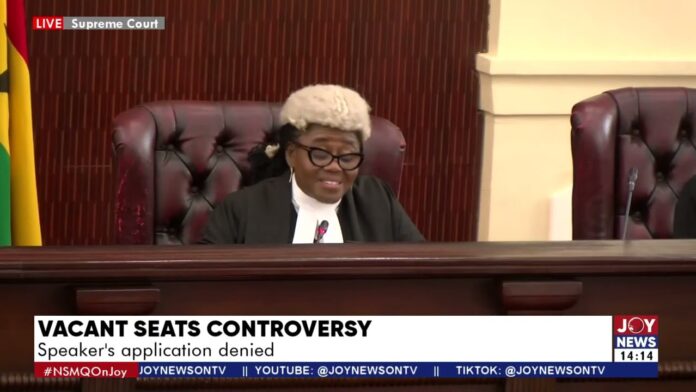Supreme Court Judge, Justice Amadu Tanko, one of the two judges to have dissented in the 5:2 majority decision in the case brought by Efutu MP Alexander Afenyo-Markin against the Speaker of Parliament, Alban Bagbin, has predicted that the majority decision may not stand the test of time.
According to him, it may not be long before the decision is overturned.
“I do not hasten to proclaim that, I have apprehended with despair the majority’s conclusion in this suit, but I state, with utmost deference to the Hon. Chief Justice and the rest of my brethren in the majority, that not only do I fundamentally disagree with their conclusion, I, with all due respect, also find the decision an aberration to the established and accepted judicial position of this court which, with profound respect, I hope in no distant future, the resultant usurpation of the constitutional prerogative of the High Court incidental to the majority decision will be reversed.”
In his ruling, rooted in a key constitutional interpretation, Justice Tanko emphasised that the Constitution itself places strict boundaries on the jurisdiction of the Supreme Court, particularly regarding matters where the High Court has been expressly designated to make certain determinations.
Justice Tanko referenced Article 99 of Ghana’s 1992 Constitution, which grants the High Court exclusive authority to rule on whether a parliamentary seat is vacant.
According to his interpretation, even if constitutional matters are presented for enforcement or interpretation, the Supreme Court cannot overstep into areas specifically assigned to other courts.
He argued that while Article 130 grants the Supreme Court original jurisdiction over constitutional interpretation, Article 99 clearly delegates the power to determine parliamentary vacancies to the High Court.
Therefore, inviting the Supreme Court to rule on this matter would effectively be asking it to assume the High Court’s authority, something he says the Constitution implicitly prohibits.
To further clarify, Justice Tanko invoked the principle of “generalia specialibus non derogant” (general rules do not override special rules), saying that when there is an apparent conflict between general and specific provisions, the specific provision prevails.
Here, while the Supreme Court generally has interpretive jurisdiction, Article 99’s specific direction for vacancy issues in Parliament takes precedence.
He noted past rulings, particularly the Parliamentary Election for Wulensi Constituency case, as guiding precedents upholding this principle and maintaining the High Court’s authority on similar matters.
“The conclusion I have arrived at should in no way be construed as suggesting that the Supreme Court is not the appropriate forum vested with jurisdiction to interpret and/or enforce the Constitution in appropriate circumstances. The point which I unequivocally emphasise is that it is the same Constitution, 1992, which vested exclusive power in the Supreme Court in matters of interpretation and enforcement of its provisions, which also designed the mechanism for this court to assume jurisdiction.
“Thus, although this court has a general jurisdiction to interpret and enforce provisions of the constitution, there are situations, such as in the instant case, where the procedure adopted in invoking this court’s interpretative and enforcement jurisdiction has deprived the court of the power to exercise that jurisdiction. This particular action clearly demonstrates more than any other case I have confronted in constitutional law jurisprudence the failure by a party to comply with mandatory constitutional provisions in invoking jurisdiction and it is destined to fail.
The above statement is supported by the recent decision of this very court in OWUSU-MENSAH VS. NAPTEX & ORS [2017-2020] 2 SCGLR 708 at 711. ’” A court might have jurisdiction to entertain a cause or matter, but the procedure invoking its jurisdiction might deny the court the jurisdiction. That would occur where a statute had specially laid down the procedure for redress.”
Justice Tanko therefore dismissed Afenyo-Markin’s suit, stating that it did not meet the necessary jurisdictional threshold for the Supreme Court.
He also underscored that if any interpretive issue arises in the High Court, that court should refer it to the Supreme Court for interpretation, but it is the High Court that must handle vacancy determinations directly.
“Having held that this court’s jurisdiction has not been properly invoked, I am unable to delve into the merits of the matter.
As this court has consistently held, a point of jurisdiction when taken and successfully upheld should foreclose any consideration of the merits of any case. For there will be no foundation upon which the merits can stand.”
ALSO READ:

